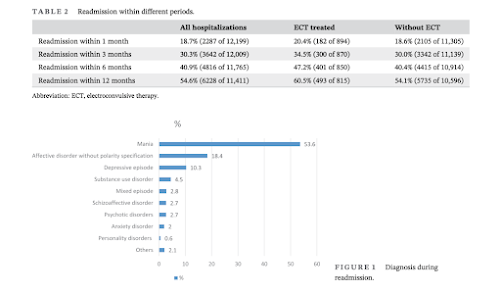Readmission After ECT For Mania : New Registry Data From Sweden
Out on PubMed, from researchers in Sweden, is this study:
Association between electroconvulsive therapy and time to readmission after a manic episode.
The abstract is copied below:
Objective: The majority of patients hospitalized for treatment of a manic episode are readmitted within 2 years despite maintenance treatment. Electroconvulsive therapy (ECT) has been associated with lower rehospitalization rates in some psychiatric conditions, but its association with readmission after a manic episode has not been investigated. Therefore, the aim of this study was to determine whether the time to readmission in patients with mania treated with ECT was longer than in patients not treated with ECT and whether there were subgroups of patients that benefited more.
Methods: This was a nationwide register-based, observational study. All patients diagnosed with bipolar disorder, manic episode, admitted to any hospital in Sweden between 2012 and 2021 were included. Patients contributed data to the study for every admission. All admissions were followed up until psychiatric readmission, death, or the end of the study (December 31, 2021). Association between ECT and time to readmission was analyzed. A paired samples model was performed for 377 patients with at least two admissions for mania, treated with ECT at one admission and without ECT at the other admission. Times to readmission were analyzed.
Results: A total of 12,337 admissions were included; mean (SD) age 47.7 (17.2), 5443 (44.1%) men. Readmission rate within 1 year was 54.6%. ECT was administered in 902 (7.3%) admissions. Within 30 days after admission, 182 out of 894 (20.4%) patients treated with ECT versus 2105 out of 11,305 (18.6%) patients treated without ECT were readmitted. There was no association between ECT and time to readmission (aHR 1.00, 95% CI 0.86-1.16, p = 0.992) in the model with all admissions. The paired samples model included 754 admissions (377 patients), mean (SD) age during admission without ECT was 45.6 (16.5), and with ECT 46.6 (16.4), 147 (39.0%) were men. In that model, readmission rate within 30 days for treatment with ECT was 19.0%, and for treatments without ECT, 24.1% (aHR 0.75, 95% CI 0.55-1.02, p = 0.067).
Conclusion: Readmission rates after inpatient treatment of mania were high. ECT was not significantly associated with longer time to readmission, but there was a trend toward a protective effect of ECT when admissions with and without ECT were compared within the same patients.
Keywords: bipolar disorder; electroconvulsive therapy; mania; readmission; rehospitalization.
The article is here.
And from the text:
Here is another excellent study from Swedish registry data. It underscores the importance of ECT for the treatment of acute manic episodes.
Kudos to Dr. Popiolek and colleagues for reminding us that ECT is a mood stabilizer, as well as an antidepressant and antipsychotic.
Next week on the blog, I will post the editorial I wrote about this study in Acta.









Comments
Post a Comment